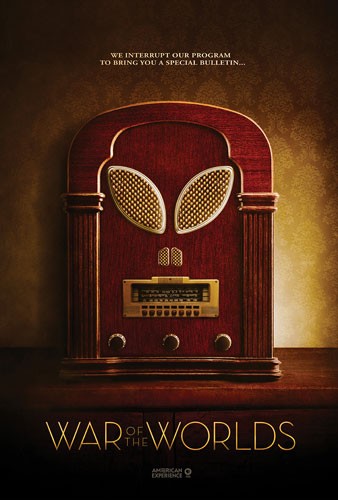
It’s been 75 years since Orson Welles caused panic among radio listeners who somehow didn’t know that his reading of H.G. Wells’ War of the Worlds was not an actual Martian attack. The CBS Radio broadcast on October 30, 1938 caused 1+ million to freak out, all under the mistaken belief that the world was being attacked by creatures from outer space.
In honor of the 75th anniversary of that broadcast, PBS will air a one hour special featuring interviews and “dramatizations of some of the thousands of letters sent to Welles by an alternately admiring and furious public.” Mercury Theater member Richard Wilson saved those letters, and according to PBS, most haven’t been read since 1938.
“The ‘panic’ caused by the broadcast has become legendary,” stated producer Cathleen O’Connell. “Using these newly discovered letters was a wonderful way to personalize the story. These rarely heard first-hand accounts, juxtaposed with the print media coverage of the day, help demonstrate the true impact of Welles’s radio drama.”
The War of the Worlds special from producer/director O’Connell will be broadcast on October 29, 2013 at 9pm ET. The one-hour program will include interviews with director/film historian Peter Bogdanovich as well as Welles’ daughter Chris Welles Feder.
Details on the War of the Worlds Special [Courtesy of PBS]:
It took place on the night before Halloween, long known as Mischief Night. It began like any other ordinary Sunday evening, with millions of Americans tuned to their radios. But beneath the outward calm was a nation tense with worry and fear; the Great Depression refused to let up, and the threat of war in Europe loomed larger every day. Then, at 8:15 p.m., the voice of a panicked announcer broke into the dance music with a news bulletin reporting that strange explosions were taking place on the planet Mars, followed minutes later by a report that Martians had landed in the tiny town of Grover’s Mill, New Jersey.
Almost instantly, frantic listeners responded to the shocking news. Chicago newspapers were flooded with calls; in St. Louis, people gathered outside to discuss what to do about the ‘invaders’; in San Francisco, many feared that New Jersey had been laid to waste and that the Martians were heading west. Callers pleaded with the power company in Providence to shut off the lights so that the city would not be seen by the invaders. Similar reports of panicked reactions came from Baltimore, Atlanta, Indianapolis, Memphis, Minneapolis, and Salt Lake.
At the epicenter of the event, New Jersey national guardsmen flooded armories with calls asking where to report. And in cities and towns across the country, people stopped a moment to pray — then grabbed their loved ones and fled into the night.
Seventy-five years later, War of the Worlds explores this legendary but misunderstood event. With the CBS radio broadcast serving as its narrative spine, the film examines the elements that came together to create one of the most notorious media events in U.S. history: our longtime fascination with life on Mars; the emergence of radio as a powerful, pervasive medium; the eagerness of newspapers to disparage their radio rivals; the shocking Hindenburg explosion of 1937, the first disaster to broadcast live; and the brilliant enfant terrible Orson Welles, the director of the drama and mischief maker supreme.






